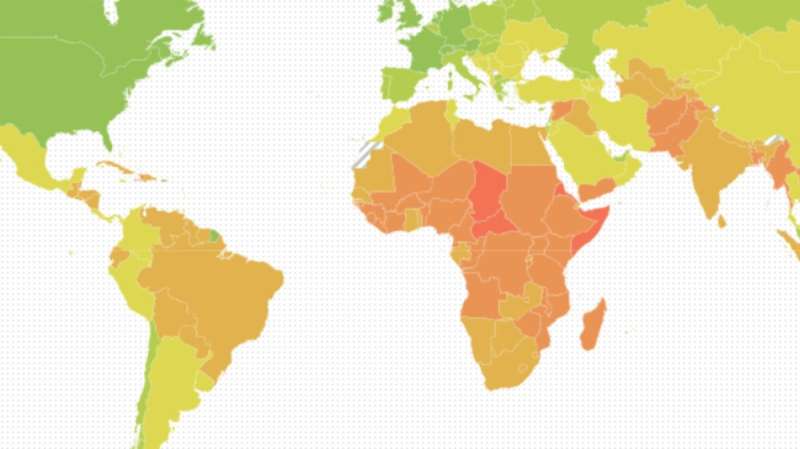Annual country index with new food dependency data reflects vulnerability to climate change

The annual update to the University of Notre Dame's Global Adaptation Initiative (ND-GAIN) Country Index shows sources for some vulnerability indicators have changed, including food dependency and urban concentration.
The new food dependency indicator, as part of the food score, incorporates more information regarding a country's external dependence on a broader range of foods that are imported, beyond cereals. The food score is intended to capture a country's vulnerability to climate change as it relates to food production, demand and nutrition, as well as population growth. Similarly, the new urban concentration indicator is more comprehensive in its scope and more frequently updated. Therefore, these updates will help the ND-GAIN Country Index better reflect how vulnerable a country is to climate change.
"By updating indicators like the food dependency, our goal is to ensure the country index is as current as possible when data sources become inactive," said Danielle Wood, ND-GAIN project director.
ND-GAIN's Country Index quantifies how 181 countries compare on vulnerability to climate impacts affecting life-supporting sectors, such as food, water and infrastructure, as well as their readiness to successfully implement adaptation solutions. The tool showcases each country on a matrix that allows users to see general comparisons on climate change vulnerability and readiness.
To create the index, researchers identified common factors of successful adaptability to climate change, such as political stability and low social inequality, to encompass the readiness score. To quantify vulnerability, the index uses nine factors, including food dependency, exposure and infrastructure. By compiling more than two decades worth of data, the country index is able to follow and rank countries as they improve, remain stagnant or become more vulnerable on these measures for climate change resilience over time.
Wood noted that many of the factors used for quantifying national vulnerability and readiness to climate change are similar to those that would indicate a country's vulnerability and readiness to a pandemic—such as the coronavirus.
"Along with the impact of COVID-19 on healthcare services and economic stability, the threat of natural disasters remains. This would likely increase the challenges in responding to climate change events, leaving already vulnerable communities even more so. Next year, the ND-GAIN data may be able to tell us something about how the pandemic has impacted climate change readiness globally," said Wood.
The ND-GAIN Country Index aims to motivate global adaptation solutions that save lives and improve livelihoods while informing policy decisions in the public sector and market positions in the private sector. By measuring the readiness to enact policy change or take on investment, the index provides strategic and operational information regarding supply chains, capital projects and community involvement. To learn about ND-GAIN or the country index, visit gain.nd.edu.
Provided by University of Notre Dame





















